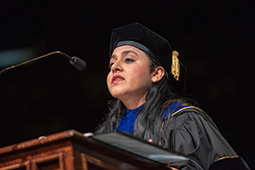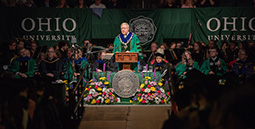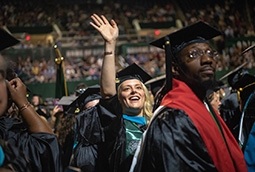
Photographer: Ben Siegel
Ohio University conferred about 900 master’s and doctoral degrees during its 2018 Graduate Commencement ceremony Friday, May 4, in the Convocation Center on the Athens Campus.
In addressing the Class of 2018, President M. Duane Nellis, presiding over his first Graduate Commencement ceremony since becoming OHIO’s 21st president last June, encouraged the graduates to bask in the moment.
“You all deserve to feel so proud. You have worked so very, very hard to get here,” Dr. Nellis said. “I want you to feel confident that the education you just received will serve you well and prepare you for the road that lies ahead.”
Acknowledging that what lies ahead is uncertain, Dr. Nellis assured the graduates, “I do know that employers will always be looking for critical thinkers, good communicators, collaborators, problem solvers, leaders. These skills you acquired right here at Ohio University, these skills are transferable regardless of what job position you hold. These skills will never fail you.”
He urged the graduates to take those skills and to use them for good, and to remember one thing: “No matter how far from this University you roam, Athens will always be your home. No matter how much our world changes, everyone in this room will continue to share a common bond that will never be broken. We are and always will be Bobcats!”
Among those joining Dr. Nellis in issuing the graduates words of advice and inspiration was Dr. Devika Chawla, a professor in the Scripps College of Communication’s School of Communication Studies and OHIO’s 2017 Outstanding Graduate Faculty Award recipient, who delivered the day’s keynote address.
Dr. Chawla’s research focuses on communicative, performative and narrative approaches to studying family, home and its relationship to social identity. Specifically, she is interested in understanding how human beings transform themselves in the relationships that surround them and the resources – social, political and economic – that are available to them.
An author of four books and numerous articles, most of Dr. Chawla’s research has taken place in the context of contemporary urban India, including the study of women’s identities in Hindu arranged marriages. Her book, “Home, Uprooted: Oral Histories of India’s Partition,” won the 2015 Outstanding Book Award from the ethnography division and the international and intercultural division of the National Communication Association.
In contemplating what she wanted to say to the graduates, Dr. Chawla said she thought about something that brings us all together.
“For me, that something is migration,” Dr. Chawla said. “I believe that your graduation today represents an important migration, a threshold into a newer personhood.”
Dr. Chawla shared three stories of migration and how she came to appreciate the virtues of migration.
The first story – one of forced migration – focused on her father, his family and their lives following the 1947 Partition of India when Britain, ending its colonial rule of India, divided the country into secular India and the Islamic state of Pakistan. Deadly riots and the displacement of millions followed.
Dr. Chawla’s family, Hindus who were living in what was deemed Pakistan, fled to India and lived in refugee colonies. The family gradually rebuilt their lives and used the gold that had not been stolen from them to educate her father and his siblings – a decision, she said, that allowed her father’s generation to lead successful lives and likely contributed to her being here.
“The lesson from this story is that even when migrations are forced upon us, if we escape them, we can survive, gain some control over our life and eventually thrive,” Dr. Chawla said. “The promise of migration always exceeds the risks that surround it. The promise of migration lies in the gift of resilience. So, when I look at my family history, I do not see only life and death, loss and beginning again. I do not see a story of victimhood. Instead, I see a story of resilience, of risk and threat, of surviving and persevering, and succeeding. Migration nurtures legacies of resilience, and resilience is both an armor and a promise.”
The second story – one of voluntary migration – was Dr. Chawla’s own story that started in August 1997 when she migrated to the United States to pursue an education, but with a promise to return to India.
While in the U.S., Dr. Chawla said she migrated several times – changing academic programs, deciding to pursue a doctorate, and migrating away from her promise to return to India even as her research was migrating toward her home country.
“Every migration is extraordinary because every migration is the start of a new life – another kind of renewal,” she said. “Voluntary migrations teach us a different lesson. They show us the power of choice. Such migrations are physically, intellectually and existentially also necessary. You have to move, so you can change and evolve, grow and learn. … To choose migration is to dream.”
The third story touched on the migration Dr. Chawla experiences as an Ohio University faculty member every day and that drives her research into narratives.
Dr. Chawla shared with the crowd all the migrations she has experienced thanks to her students. A tearoom in Hangzou, China. Farmhouses in rural Illinois. The life of an undocumented Thai worker.
“These people, places and their worlds are the subjects and sites and research of my doctoral students,” she said. “Teaching, working with and advising Ph.D. students means I accompany them into new spaces, new people, new stories. When my advisees begin new work, I feel a sense of excitement because I am invited to migrate into a new story. And, with each story, I know I and we will become something new.
“Entering a story, even briefly, is a form of migration,” she added. “It makes us travel into the humanity of another person.”
Dr. Chawla noted that, as professor, she enters a new world every semester even if the coursework doesn’t change – because the students do change and “bring fresh ways to encounter old stories.”
As the Class of 2018 was about to embark on another migration, Dr. Chawla encouraged the graduates to remember that migration and travel – no matter their form – are about resilience, opportunity and invitation.
“Choose migration. Choose your migration. Discover its virtues. And,” Dr. Chawla said with a nod to last spring’s Graduate Commencement speaker, Dr. Risa Whitson who urged the graduates to think about what counts, “make it count.”
Honoring OHIO’s faculty
The Graduate Commencement ceremony also included moments of recognition for OHIO’s faculty – general recognition for the role they played in helping the day’s graduates reach this defining moment in their academic journeys and their lives, and special recognition for two faculty members.
“Thank you for your dedication to our students – a dedication that starts with your commitment to your respective professions,” Interim Executive Vice President and Provost Elizabeth Sayrs said. “Your scholarly endeavors have helped make Ohio University a world-class institution of higher education. … Your work is the very heart of the mission of Ohio University.”
2018 Outstanding Graduate Faculty Award
Dr. Sayrs announced the recipient of this year’s Outstanding Graduate Faculty Award – Dr. Michael Sweeney , a professor in the Scripps College of Communication’s E.W. Scripps School of Journalism and associate director for graduate studies – who, she said, “embodies dedication, the determination as well as teaching excellence.”
Established in 1972, the Outstanding Graduate Faculty Award recognizes an OHIO professor who has demonstrated exemplary performance as an instructor, researcher and faculty member.
A veteran newspaper journalist, leading expert on censorship of war-time news coverage, author of 22 books, and a graduate of Ohio University, Dr. Sweeney’s resume includes reporting for National Geographic and covering the progress of Dr. Robert Ballard’s 2004 expedition to the Titanic. He is the editor of Journalism History , the oldest journal of mass media history in the United States.
Some of Dr. Sweeney’s students describe him as a “knowledgeable, empathetic and inspiring faculty member.” Another said, “He goes out of his way to help students and makes them a top priority.” Yet another said, “The daily impact he has on the student experience at Ohio University has been outstanding.”
As OHIO’s 2018 Outstanding Graduate Faculty Award recipient, Dr. Sweeney will deliver the keynote address at the 2019 Graduate Commencement.
2018 Distinguished Professor
President Nellis returned to the podium to announce the 2018 recipient of the University’s highest academic honor. Dr. Susan Burgess , a professor of political science in the College of Arts of Sciences, was named Ohio University’s 2018 Distinguished Professor.
Established in 1959, the Distinguished Professor Award recognizes scholarly accomplishment, professional reputation and contribution to the University. Recipients of the award receive a lifetime designation, one semester of professional leave and the privilege of naming one undergraduate student annually to receive a Distinguished Professor Scholarship.
“Our recipient of this award is remarkably deserving of this honor,” Dr. Nellis said.
Dr. Burgess’ areas of study include American politics, law and courts, gender and sexuality, and pop culture. She has received several departmental and University-wide awards for excellence in teaching, has served as the director of the Women’s Studies program, and also held several leadership positions in the American Political Science Association.
Comments from the Class of 2018
For Ciara Hudson of Toledo, Ohio, Friday’s Graduate Commencement ceremony signified a moment of “completion.”
Hudson completed a two-year online program offered through OHIO’s College of Health Sciences and Professions, earning a master of health administration degree. She said she plans to continue working in the field of mental health and possibly start her own facility for individuals with developmental disabilities.
Taylor Snelick of Canal Fulton, Ohio, was graduating from OHIO’s Voinovich School of Leadership and Public Affairs with a master of science in environmental studies.
“I’m sad because it’s the end of my time at Ohio University, but I’m really excited for what’s to come,” Snelick said.
Snelick said she intends to pursue some internship opportunities and research positions, noting that her coursework at OHIO inspired her to do some on-the-ground research.
“My Ohio University experience has really inspired me to broaden my horizons, to collaborate with people from different backgrounds and situations and from all angles of environmental problems to solve some of those wicked issues that we face,” Snelick said.
For Charles “Chuck” Stall of New Orleans, Louisiana, Commencement day marked only his second time on the Athens Campus.
“I love it. It’s great here,” Stall, a graduate of the Patton College of Education’s online Master of Coaching Education Program, said. “I’m 33 years old, so I’m getting my master’s degree a little bit later. … This experience was all about finishing some unfinished business and getting a second crack at academics. I’m graduating with over a 3.9 (GPA), and I’m very happy about that.”
A teacher, Stall said his studies have made him a little more sensitive to his students.
“Being back on the other side of the desk has given me a new perspective,” he said.
Stall is returning to New Orleans to become a director of alumni development and to continue to coach wrestling.
“This degree did help me to get my promotion,” he added.

Photographer: Ben Siegel President M. Duane Nellis participated in his first Graduate Commencement ceremony at OHIO on Friday, May 4.

Photographer: Ben Siegel Ellenore Holbrook waves to her supporters at Graduate Commencement on May 4 in the Convocation Center.

